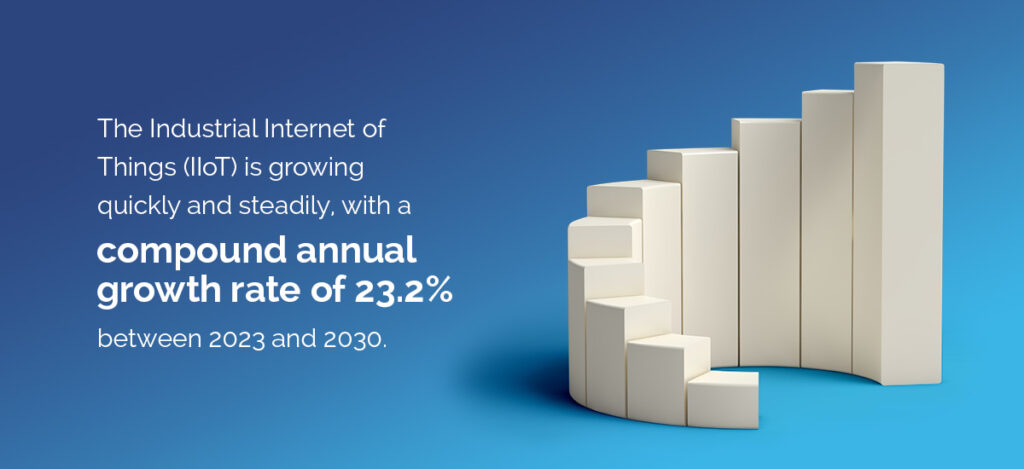How AI is Revolutionizing the Supply Chain

September 27, 2023
Like many industries, the supply chain world is being transformed by artificial intelligence (AI). AI excels at handling massive amounts of data, making predictions, and connecting multiple data sources — tasks that supply chain managers rely on in an increasingly complex field. AI can easily handle these demands and tackle some of the biggest challenges in supply chain management.
Research from McKinsey found that early adopters of AI improved logistics costs by 15%, service levels by 65%, and inventory levels by 35% compared to slow-moving competitors. The benefits of artificial intelligence in supply chain management are extensive and likely to grow in the future.
How is AI Used in the Supply Chain?
Today’s supply chain is increasingly complicated, with large product portfolios, numerous partners, market volatility, rising costs, and demands for environmental sustainability. AI can help businesses connect all data points under one umbrella and develop an end-to-end approach. It can predict, analyze, and automate for complete visibility.
Some tasks an AI supply chain can help with include:
- Demand forecasting: AI models can incorporate virtually unlimited data points to develop sophisticated predictions and help guide business decisions. They can analyze different market segments and relationships, even assessing elements such as upcoming holidays and buying trends.
- Real-time inventory management: With AI, you can keep a closer eye on your inventory. It helps prevent overstocking and stockouts, automatically adjusting based on current conditions. For example, you could use AI to determine when to re-order certain items according to demand and the current supply of similar products.
- Automation and robotics: If automation is one of your goals, AI has significant potential. It can dynamically respond to problems and new demands, including problem-solving requirements, and help an automated system work more effectively.
- Real-time monitoring: AI supports end-to-end transparency with responsive monitoring. For instance, you can use it to keep tabs on perishable items and take action if they approach their best-by dates.
These are just a few examples of how AI can help, but the opportunities are expansive.
The Benefits of Artificial Intelligence in Supply Chain Management
AI in supply chain management offers a wide range of advantages, helping businesses meet goals related to efficiency, accuracy, and more.
1. Improved Efficiency
AI and automation can drastically improve efficiency in warehouses and other fulfillment stages. They can speed up fulfillment with automated processing and intelligent problem-solving. For example, if an AI model sees a delay in one fulfillment phase, it can flag the on-staff manager or automatically re-prioritize other shipments to avoid bottlenecks.
AI in supply chain management can also help reduce labor demands by eliminating slow, cumbersome activities and allowing staff members to focus on tasks that require human involvement.
2. More Accuracy
Automation eliminates manual processes, which are inherently error-prone. When paired with AI, supply chains can reliably conduct these processes and solve problems with a high degree of accuracy.
AI has access to more data and doesn’t require time-consuming data entry. It can finish tasks such as submitting orders and recording inventory levels and quickly make sense of massive data sets.
3. Real-Time Monitoring
The Industrial Internet of Things (IIoT) is growing quickly and steadily, with a compound annual growth rate of 23.2% between 2023 and 2030. Much of this industry relies on sensors and smart equipment that collects and analyzes data. In the supply chain, monitoring solutions can provide granular, detailed insights into the state of materials, equipment, and products.

For instance, a sensor could detect the weight of a storage rack. If it drops below a certain value that correlates to low stock, it could notify a manager or automatically re-order more product. AI could also monitor shipping times and take action if an order gets delayed.
With a wide range of IIoT possibilities and AI models, you can create detailed dashboards with tons of details on the supply chain.
4. More On-Time Delivery
From partners to customers, AI can help you ensure more on-time deliveries. Today’s supply chain involves considerable volatility, so you need to be ready for any possible disruption.
AI can monitor for these issues, such as delays and cancellations, and, in many cases, respond to them with optimized solutions. An AI model may flag orders for review, automatically update customers, or place an order from an alternate supplier.
5. Actionable Insights
Another area where AI shines is through forecasting and insights. This technology can generate predictions and models to help you make better business decisions. It could analyze your supplier list or manufacturing process to continuously identify gaps or potential areas for improvement.
How AI Solves Major Supply Chain Challenges
Currently, the global supply chain currently faces a wide range of challenges, such as rising costs, delays, and sustainability problems. Almost three-quarters of business leaders plan to adopt new technologies to tackle these challenges.
AI has a vital role to play. Some of the modern supply chain challenges that AI can solve include:
- Volatility: Conditions can change quickly, and AI offers round-the-clock, fast problem-solving that puts all of your data to work. It monitors for disruptions and takes action, all without training, breaks, or other staffing requirements. With the right tools, AI can connect nearly unlimited resources, including a large number of partners, so you can diversify your supply chain and ensure more resilience.
- Rising costs: An efficiency-focused AI model can help many businesses offset rising supply chain costs and save money. You can spend less on shipping due to optimized service selection or avoid costly stockouts thanks to proactive AI monitoring. With access to more data, AI systems can help find the most cost-effective options for your specific business scenario.
- Sustainability: Similarly, AI can access information from shipping partners and help you find services with the least environmental impact. It could consider variables such as weight, packaging material, and proximity to shipping hubs.
- Staffing challenges: By automating tedious, time-consuming tasks, AI can help ease the process of managing a large team. Instead, businesses can refocus their human labor on tasks that can’t be automated. AI can also help in areas such as staffing and safety requirements. For example, it could generate optimized schedules considering worker certifications, preferences, and real-time labor demands.
- Omnichannel satisfaction: Today’s customers — businesses and consumers — use multiple channels to communicate and buy items. AI can incorporate various channels into one streamlined system. With intelligent automation, you can branch out into more markets and satisfy customers from all channels.
Using TrueCommerce to Strengthen Your Supply Chain

AI is a powerful force in the future of supply chain management. As technology advances, we can only expect it to offer more sophisticated solutions in the industry. It’ll likely become easier to implement and adapt to emerging new challenges.
Whether you’re already dabbling in AI or considering it, you’ll need a system to bring all your data sources under one roof. TrueCommerce makes this possible with electronic data interchange (EDI). Explore our solutions, or contact us to learn more about integrating EDI into your supply chain for a comprehensive solution prepared for the future.
Check out the IDC MarketScape: Worldwide Multi-Enterprise Supply Chain Network (MESCCN) 2023 Vendor Assessment where TrueCommerce is recognized as a Leader.
Share this post:
Stay ahead of the competition
Get expert supply chain insights delivered directly to your inbox weekly.